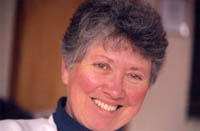I first encountered Cathryn Wellner last year when she sent me an e-mail critical of my 9-11 blog post; I subsequently published her response as its own entry. We’ve kept in touch and become connected on some social-media venues. She is a powerhouse of thought and writing about storytelling and other topics. I’m so pleased to present this Q&A with Cathryn, which will run over the next five days.
Bio: Cathryn Wellner began her professional career as a French teacher and school librarian, in Idaho, Washington, and New York. She traveled for 10 years as a storyteller and workshop leader, mostly in the U.S., but also in Europe, the UK, and Canada. After moving to Canada, she spent 13 years as an organic farmer, small-scale rancher, and, when she realized community organizing was really about stories, a community developer. After serving as the first Project Coordinator for HEAL (Healthy Eating and Active Living in Northern British Columbia), she moved to Oakland, California to be storytelling director for Stagebridge (America’s oldest senior theatre troupe). She returned to BC to take on the post of food and health manager for Interior Health. She now lives in the beautiful Okanagan Valley and focuses full-time on storytelling and writing. She has three blogs on the go: Story Route , Catching Courage, and Crossroads.
, Catching Courage, and Crossroads.
Q&A with Cathryn Wellner, Question 1:
Q: On your bio page, you talk about transitioning from a performance storyteller to an organizational storytelling consultant: “Then I realized the secret. It was all about stories. I was in a rural community that needed to be able to tell compelling stories to urban bureaucrats, politicians, project funders, and its own citizens.” How did you come to this realization? Can you elaborate on how you applied your experience as a performance storyteller to your new career? Do you still do any performance storytelling?
A: The realization was not instantaneous. For the first while, I had the usual worries: Someone would find out I was actually a storyteller masquerading as a community developer. Then it would be game up.
What happened instead was that I began to insert stories into presentations and to use storytelling techniques to prepare reports. It wasn’t long before I was seen as a storytelling community developer. Or was it a community organizing storyteller?
As a performer, I’d always loved that moment when the room goes still, when it almost feels as if everyone in the room is breathing together. When I added stories to my community development presentations or used the narrative arc to frame a report, I experienced that same stillness, that total attention.
From that point on, my performance storytelling has taken a back seat. I still do it occasionally, sometimes as a guest who’s asked to tell a few stories, sometimes in performance. But my focus has been on storytelling as a means of sharing the extraordinary work done by people and organizations working for the good of community.
